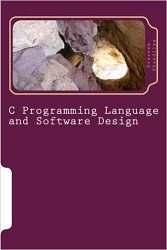
|
FreeComputerBooks.com
Links to Free Computer, Mathematics, Technical Books all over the World
|
|
- Title: An Introduction to the C Programming Language and Software Design
- Author(s) Tim Bailey
- Publisher: The University of Sydney
- Paperback: N/A
- eBook: PDF (153 pages)
- Language: English
- ISBN-10: N/A
- ISBN-13: N/A
- Share This:

|
This textbook was written with two primary objectives. The first is to introduce the C programming language. C is a practical and still-current software tool; it remains one of the most popular programming languages in existence, particularly in areas such as embedded systems. C facilitates writing code that is very efficient and powerful and, given the ubiquity of C compilers, can be easily ported to many different platforms. Also, there is an enormous code-base of C programs developed over the last 30 years, and many systems that will need to be maintained and extended for many years to come.
The second key objective is to introduce the basic concepts of software design. At one-level this is C-specific: to learn to design, code and debug complete C programs. At another level, it is more general: to learn the necessary skills to design large and complex software systems. This involves learning to decompose large problems into manageable systems of modules; to use modularity and clean interfaces to design for correctness, clarity and flexibility.
About the Authors- N/A
- The C and Objective-C Programming
- Software Design and Patterns
- C++ Programming
- Unix/Linux Programming

- An Introduction to the C Programming Language and Software Design (Tim Bailey)
- The Mirror Site (1) - PDF
-
 Modern C (Jens Gustedt)
Modern C (Jens Gustedt)
Take your C programming skills to new heights, whether you're just starting out with C or have more extensive experience. Organized by level, this comprehensive guide lets you jump in where it suits you best while still reaping the maximum benefits.
-
 Beej's Guide to C Programming (Brian Hall)
Beej's Guide to C Programming (Brian Hall)
This book introduces you to the most commonly used programming language, for computer users who would want to have an idea what is happening behind the scenes as they work with various computer programs.
-
 O'Reilly® Using C on the UNIX System (David A. Curry)
O'Reilly® Using C on the UNIX System (David A. Curry)
This book provides a thorough introduction to the UNIX system call libraries. It is aimed at programmers who already know C, but who want to take full advantage of the UNIX programming environment.
-
 Introduction to C and GUI Programming (Simon Long)
Introduction to C and GUI Programming (Simon Long)
This book is an introduction to C, and covers the basics of writing simple command-line programs. It also shows how to use the GTK user interface toolkit with C to create feature-rich GUI applications which can be run on the desktop.
-
 Deep C (and C++) by Olve Maudal and Jon Jagger
Deep C (and C++) by Olve Maudal and Jon Jagger
We will study small code snippets in C and C++, and use them to discuss the fundamental building blocks, limitations and underlying design philosophies of these wonderful but dangerous programming languages.
-
 Programming Persistent Memory: A Comprehensive Guide
Programming Persistent Memory: A Comprehensive Guide
The book explains fundamental concepts, provides an introduction to Persistent Memory programming APIs for C, C++, JavaScript, and other languages, discusses RMDA with persistent memory; reviews security features; and presents many examples.
-
 Notes on Data Structures and Programming Techniques in C
Notes on Data Structures and Programming Techniques in C
There are two purposes to this book: to teach you to program in the C programming language, and to teach you how to choose, implement, and use data structures and standard programming techniques.
-
 The C Book: Featuring the ANSI C Standard, 2nd Edition
The C Book: Featuring the ANSI C Standard, 2nd Edition
This book presents an introduction to the C programming language, featuring a structured approach and aimed at professionals and students with some experience of high-level languages, includes highlights of common traps and pitfalls in C programming.
-
 Learn to Code with C (Simon Long)
Learn to Code with C (Simon Long)
This book is an introduction to programming in C for absolute beginners; you don’t need any previous programming experience, and a Raspberry Pi running Raspbian is all you need to get started.
-
 The Art and Craft of Programming, C Edition (John C. Lusth)
The Art and Craft of Programming, C Edition (John C. Lusth)
This book is designed to be used as the primary textbook in a college-level first course in computing. It takes a fairly traditional approach, emphasizing problem solving, design, and programming as the core skills of computer science.
-
 Object-Oriented Programming with ANSI-C (A. Schreiner)
Object-Oriented Programming with ANSI-C (A. Schreiner)
This book is not going to praise object-oriented programming or condemn the Old Way. It's simply going to use ANSI-C to discover how object-oriented programming is done, what its techniques are, why they help us solve bigger problems,
-
 The New C Standard: An Economic and Cultural Commentary
The New C Standard: An Economic and Cultural Commentary
This book is about the latest version of the C Standard, ISO/IEC 9899:2000 plus TC1 and TC2. It is structured as a detailed, systematic analysis of that entire standard. This book is driven by existing developer practices, not ideal developer practices.





